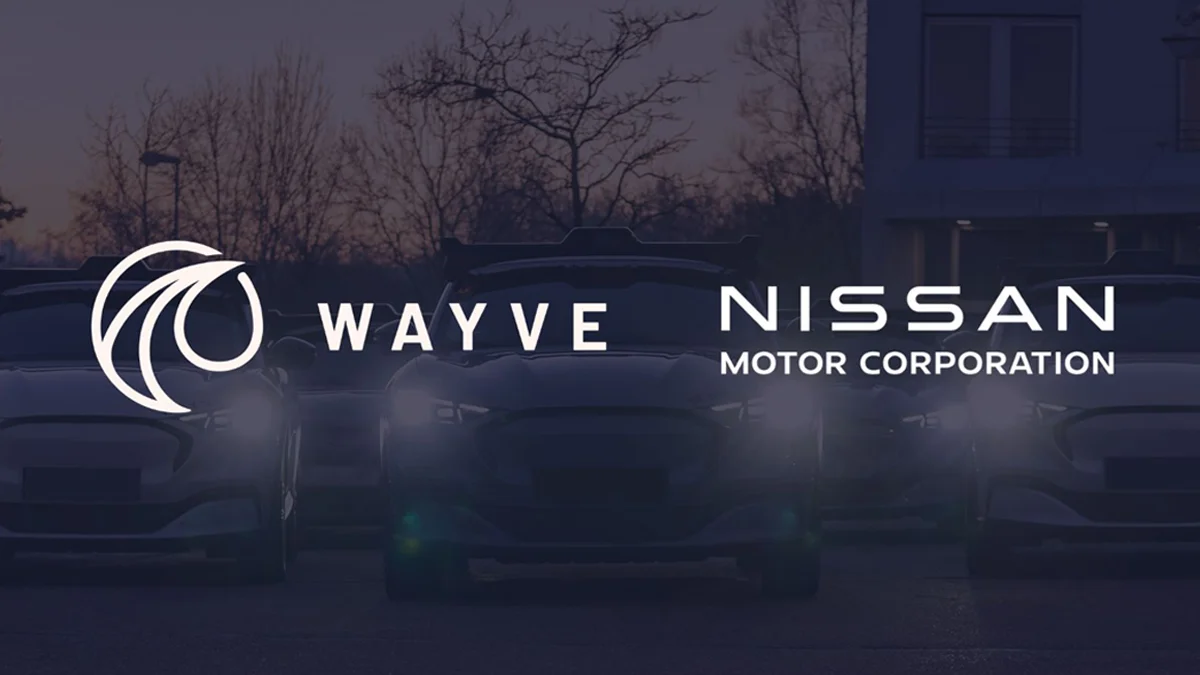Necessary Always Active
Necessary cookies are required to enable the basic features of this site, such as providing secure log-in or adjusting your consent preferences. These cookies do not store any personally identifiable data.
|
||||||
|
||||||
|
||||||
|

UK startup Wayve signed its first commercial deal with car maker Nissan to integrate its self-driving technology in its vehicles, TechCrunch reported. Nissan said it will use Wayve’s self-driving technology to support its driver assistance system beginning 2027. Wayve has raised over $1.3 billion from a range of tech investors including Uber, Nvidia, SoftBank Group, and Microsoft.
The Wayve and Nissan partnership will see the Japanese car manufacturer integrate Wayve’s software and sensors into its ADAS system called ProPilot. According to the vehicle maker, the Nissan ProPilot upgrade will set a new standard for self-driving by introducing advanced collision avoidance capabilities.
“Wayve AI Driver software, built on Wayve’s embodied AI foundation model, is designed to handle highly complex real-world driving conditions in a human-like manner. The technology’s ability to efficiently and rapidly learn from vast amounts of data ensures continuous advantage to Nissan vehicles in the future,” Wayve said in a statement posted on its website.
Last month, Wayve announced that it would open a new testing and develop center in Germany. It also plans to introduce operations in Japan, which is home to its largest backer, SoftBank.
Wayve adopted a self-learning approach as opposed to a rule-based approach in developing its self-driving software. The self-learning aspect of the software is particularly appealing to car manufacturers because it does not depend on specific HD maps or sensors. This allows the system to work with existing sensors like radar and cameras.
Wayve’s technology in Nissan vehicles will capture data from sensors to inform driving decisions in the ADAS system. The startup uses the Orin system-on-chip created by Nvidia. Its CEO and Co-founder Alex Kendal said the software can run on any GPU that its OEM partners use in their vehicles. This compatibility makes the software cheaper to run and easy to use in robotaxis, and advanced driver assistance systems.
“Entering into ADAS is really critical because it allows you to build a sustainable business, to build distribution at scale, and to get the data exposure to be able to train the system up to Level 4,” Kendall said during the Nvidia GTC conference last month.
Nissan said it will commence mass production of its ADAS system by 2027. This will be a Level 2 system, which means it will operate under the supervision of a human. The automaker did not state which car models will feature the upgraded system.
The Society of Automotive Engineers defines Level 2 softwares as systems that have the capability to automate different driving tasks, including braking and steering. However, such systems still require human drivers to maintain control throughout. Wayve has captured the attention of car manufacturers and investors due to its AI-powered automated self-driving technology.
Wayve has adopted a data-driven, end-to-end learning approach in designing an assisted driving software that’s both eyes on and eyes off. Nissan says that Wayve’s Embodied AI model coupled with its large-scale end-to-end AI that’s trained on huge volumes of real-world driving data makes the software adaptable to different vehicle platforms and environments.
“Leveraging Nissan’s technology and Wayve’s AI, we are confident it will allow future Nissan vehicles to closely replicate the judgment and actions of a careful and competent human driver in complex driving scenarios,” Nissan spokesperson Shiro Nagai said.
Wayve’s self-learning technology is very similar to Tesla’s Full Self-Driving software. Since its launch in 2017. However, Wayve’s self-driving technology approach also differs from Tesla’s in the sense that Tesla relies on cameras only. Wayve’s approach incorporated lidar to achieve a near full autonomy level.
“It depends on the product experience you want. Do you want the car to drive faster through fog? Then maybe you want other sensors like lidar. But if you’re willing for the AI to understand the limitations of cameras and be defensive and conservative as a result? Our AI can learn that,” Kendall added.
Unlike Tesla which integrates its software in its own vehicles, the UK tech startup plans to market its Wayve Embodied AI to tech companies and automakers.